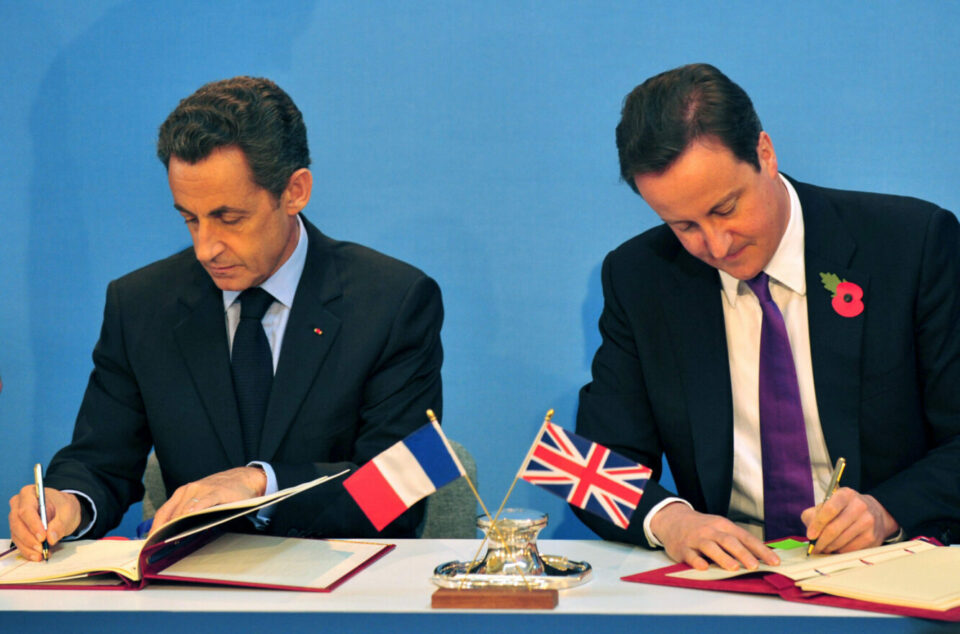How have the UK and France worked together in the Eurotom initiative?
“`html
Joining Forces: Could the UK and France Revolutionize the Third Nuclear Age Together
The Context of the Third Nuclear Age
The Third Nuclear Age refers to a renewed interest in nuclear technology, driven by advances in science and the growing need for sustainable energy solutions. In this current era, the UK and France stand at the forefront of nuclear innovation, possessing extensive nuclear capabilities and expertise.
Understanding Nuclear Energy’s Evolution
- First Nuclear Age
- Second Nuclear Age (1960-2000): Focus on nuclear energy for power and military deterrents.
- Third Nuclear Age (2000-present): Emphasis on innovative reactor designs, safety, and sustainable energy.
Collaborative Opportunities between the UK and France
Given their technological advancements and shared goals, the UK and France have numerous opportunities for collaboration in the Third Nuclear Age. These include:
- Joint research and development projects.
- Shared nuclear safety regulations and standards.
- Collaborative training programs for workforce development.
- Investment in nuclear fusion research and development.
Case Studies of Successful Cooperation
1. The Eurotom Initiative
The UK and France have been long-standing members of the European Atomic Energy Community (Eurotom), which focuses on fostering nuclear research and development across Europe. A key project has been:
- Development of advanced nuclear reactors, including Generation IV reactors.
2. The Role of the International Thermonuclear Experimental Reactor (ITER)
The ITER project, located in southern France, is a testament to international cooperation in nuclear fusion research, with the UK playing an integral role in the consortium. This project seeks to prove that fusion can be a viable source of energy. Key elements include:
- Sharing technological expertise in plasma physics.
- Collaborating on Industry partnerships for advanced materials.
Benefits of UK-France Nuclear Collaboration
By joining forces, the UK and France can unlock several benefits:
- Enhanced Innovation: Pooling resources can lead to faster advancements in nuclear technology.
- Increased Energy Security: Collaborative efforts can help both nations reduce dependency on external energy sources.
- Economic Growth: Development of cutting-edge technology can lead to job creation and new market opportunities.
- Environmental Impact: Nuclear energy is a low-carbon alternative, crucial for addressing climate change.
Practical Tips for Effective Collaboration
- Establish Clear Communication Channels: Regular updates and briefings can enhance transparency.
- Foster a Culture of Trust: Building personal relationships can improve cooperation among stakeholders.
- Invest in Joint Training Programs: This can build a skilled workforce capable of meeting future nuclear challenges.
The Future of the Third Nuclear Age: Integrating Emerging Technologies
The integration of technology such as artificial intelligence and big data analytics can significantly enhance nuclear safety and operational efficiency. The UK and France can collaborate in the following areas:
- Smart Grid Technology: Innovating energy distribution and efficiency.
- Advanced Reactor Designs: Developing small modular reactors (SMRs) that offer flexibility and safety.
- Nuclear Research Framework: Utilizing mechanisms within existing treaties like TEUTATES could facilitate deeper technical exchanges particularly concerning advanced radiographic studies aimed at enhancing safety protocols associated with existing warheads’ lifecycle management processes through facilities such as Epure which presently boasts capabilities unrivaled globally without sharing information publicly outside national confines—notably protecting data / specifications unique to each country’s arsenal investments from potential adversaries;
- Regional Stability Initiatives: Growing geopolitical tensions arising from China compel London & Paris alike into greater visibility through conventional deterrence strategies exemplified via operations aimed at safeguarding open maritime routes ideally leading towards establishing a permanent European Carrier Strike Group which would strategically position them against possible encroachments impacting Europe’s broader interests downstream;
- Evolving Roles & Approaches: Renewing commitment under frameworks designed initially for land-based units—the Combined Joint Expeditionary Force presents potential new utility if reemployed purposefully integrating joint aerial capabilities together enabling better experimentation exploring interoperability metrics across future engagements thus strengthening overall regional deterrent posture collectively deployed therein.
Strengthening Nuclear Ties: The UK and France’s Strategic Collaboration
The nuclear landscape in Europe is heavily influenced by two key players: France and the United Kingdom. As the only nations in Europe possessing nuclear capabilities, they have been integral to NATO’s nuclear deterrence strategy since the Ottawa Communique of 1974. Interestingly, although France has opted out of joining NATO’s Nuclear Planning Group, both countries have established a robust partnership characterized by substantial dialogue and technical discussions regarding nuclear matters. Notably, their bilateral cooperation in this domain has persisted despite various political challenges and diplomatic fluctuations.
The New Era of Nuclear Policy
As we transition into what can be termed a “third” era of nuclear strategy, both nations find themselves ideally situated to enhance their collaborative efforts further. By focusing on advancements in emerging technologies, addressing threats in the Indo-Pacific region, and striving for improved operational compatibility between their military forces, they can fortify their strategic positions. Amid heightened global competition among nuclear-armed states, Anglo-French synergy stands as a crucial pillar for ensuring each nation maintains its relevance while solidifying Europe’s stance on the international stage.
A Historical Perspective on Cooperation
Historically speaking, cooperation between Britain and France regarding nuclear issues has not always been strong. Their paths began to diverge during the late 1950s through the 1960s; while the United States strengthened its alliance with Britain through agreements like the Mutual Defence Agreement signed in 1958—which included sharing submarine-launched ballistic missiles—France pursued independent avenues under President Charles de Gaulle’s leadership. This period marked France’s withdrawal from NATO’s unified command structure following events that shaped its approach towards sovereignty within European institutions.
Despite these early divergences, defense partnerships continued albeit with shifts towards aviation collaboration; one notable output was Concorde—the supersonic passenger aircraft launched shortly after France’s NATO exit. In subsequent decades—particularly throughout the 1970s—the momentum for cooperation resumed as U.S.-French relations thawed under Nixon’s administration policies that were more lenient about French proliferation endeavors.
By establishing frameworks such as the Joint Nuclear Commission in 1992—alongside public affirmations like those found within the Chequers Declaration of 1995—bilateral relationships matured significantly. The Lancaster House Treaty executed in 2010 exemplified an ambitious step forward for collaboration across both conventional military strategies as well as atomic defense measures; this was further bolstered by supplemental agreements ensuring continued support amid financial constraints surrounding their respective stockpile maintainment efforts.
Modern Enhancements to Joint Initiatives
In assessing ways forward post-2023 regarding UK-French relations around strategic assets during this evolving nuclear age—a three-pronged approach focusing on research collaborations could yield significant improvements:
Navigating Challenges Ahead
Despite promising avenues ahead however there still lie considerable hurdles impeding closer ties particularly due interpersonal complexities intertwined amongst respective experiences shared historically via relations established previously—with perceptions oftentimes favoring balancing over full convergence stemming initially due concerns surrounding America’s longer-term commitments adjacent continentally given differing circumstances surrounding ongoing projects such AUKUS forming climate recently aggravated exigencies impacting discussions materially redirecting focus back onto domestic priorities instead negatively influencing external ambitions simultaneously hindering alignment opportunities shared amongst trilateral partners expecting complimentary arrangements behind any shift trending elsewhere should any emerge forthwith thereafter continuing risking detracting consensus developed steadily since foundational agreements fabric passed down resiliently throughout prior engagement iterations set forth historically illustrated above studied primarily covering mutual goals enduringly sought optimizing maximum regional security resilience actively fostering peace amongst allies secured jointly expanding confidence vis-à-vis common adversarial threats encountered henceforth abroad together ultimately securing predictable life-sustaining dynamism pivot-worthy enduringly afloat etching viable futures geared tactically cohesive responsive collaborative-enhanced methodologies thereby producing necessary deviations positively motivating coherence action scarcely attainable long ago yet now fresh possibilities seemingly abound warrant aiming hard pressed attempts toward convergence.
A Bright Future Together?
Ultimately capitalizing effectively leveraging synergies discovered anew extending soliciting convergence alongside comprehending aspirations where aligned remains vital lest misperceptions proliferate inadvertently creating faults needing critical surrounds tackled holistically without fuss altogether thereby realizing elevative prospective steps beholding fuller alliances devoted progressing upon culturally distinct landscapes notably pivotal engaging maneuverability forms meeting external obligations dutifully whilst attempting satisfy inherently individual prerogatives accordingly signaling strength qualities exhibited harmoniously alongside advantageous cooperative consequences desired actionable development paths ultimately remaining illuminating pivotal success!
With insightful analysis backing Paul Cormarie serves multifaceted roles spanning policy analyst responsibilities matched expertly representing centers proficient discussing military ascendance highly regarded below enlisted exhibits showcasing regionally connected threat mitigation against emerging challengers faced rightly moving onward transitioning effectively assisting diligently navigating oceans vast ever-changing tides demanding strategic shifting dynamics tasked undertaking arduous undertakings ensuring sustainable security outreach explore pathways exciting journey lays ahead awaiting witnessed keen eyes likely eager clarity unfolding sketched horizon beckoning bright exhilarating potentials lingering forthcoming omens pregnant fruitful possibilities yearning embrace!


